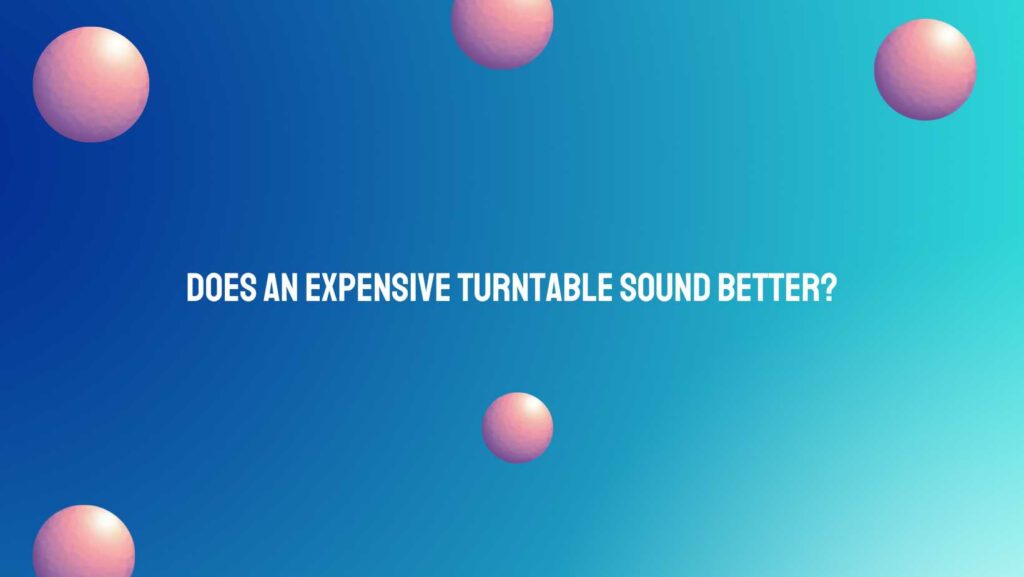Vinyl records have made an impressive comeback in recent years, thanks to their warm and nostalgic sound quality. As more people delve into the world of vinyl, one of the most common debates centers around turntables. Specifically, does an expensive turntable really sound better than a budget-friendly counterpart? In this article, we’ll explore this question in-depth, considering various factors and their impact on sound quality.
The Turntable as a Key Component
Before delving into the debate of cost and sound quality, it’s crucial to understand the turntable’s role in the analog audio chain. A turntable, or record player, is the device that physically plays the vinyl record, converting the grooves’ analog information into an audible sound. It consists of several components, including the plinth, platter, tonearm, cartridge, and stylus (needle).
Key Factors Affecting Sound Quality
- Build Quality:
Expensive turntables often feature superior build quality. High-quality materials, precise engineering, and meticulous craftsmanship result in greater stability and reduced vibration, which can significantly impact sound quality. This is because any vibration can translate into unwanted noise and distortion.
- Motor and Speed Control:
The quality of the turntable’s motor and speed control mechanisms can greatly influence playback. Expensive turntables usually employ more accurate, stable motors and sophisticated speed control systems, resulting in smoother and more consistent rotation. This helps maintain proper pitch and tone.
- Tonearm and Cartridge:
The tonearm and cartridge are responsible for tracking the record’s grooves and translating them into an electrical signal. Expensive turntables tend to feature higher-end tonearms and cartridges, which offer improved tracking accuracy, lower distortion, and better overall fidelity.
- Stylus Quality:
The stylus, or needle, that comes into direct contact with the record groove is crucial to sound quality. Expensive turntables often include higher-quality styli that reduce record wear and provide better detail and clarity.
- Isolation and Anti-Vibration Measures:
Expensive turntables are typically designed with advanced isolation and anti-vibration features to minimize external disturbances. This helps maintain a stable and clear sound even in less-than-ideal listening environments.
- Upgradability:
Many high-end turntables are designed with upgradability in mind. This means that audiophiles can further improve their sound quality by upgrading components like cartridges, tonearms, and phono stages.
Does Cost Correlate with Sound Quality?
While it’s clear that expensive turntables often include superior components and craftsmanship, it doesn’t necessarily mean that they will always sound better. The relationship between cost and sound quality is not linear. In many cases, the law of diminishing returns applies. Going from a budget turntable to a mid-range model may yield a significant improvement in sound quality, but the difference between a mid-range and high-end turntable might be less pronounced.
Factors such as the quality of your vinyl records, the condition of the records and stylus, the quality of the rest of your audio system (including speakers and amplifiers), and your listening environment play significant roles in the perceived sound quality.
Consider Your Budget and Priorities
When choosing a turntable, it’s essential to consider your budget and priorities. If you’re a casual listener or new to vinyl, an entry-level turntable can provide a delightful listening experience without breaking the bank. However, if you’re a passionate audiophile seeking the highest possible sound quality, investing in a high-end turntable might be justifiable.
In conclusion, the debate over whether an expensive turntable sounds better is nuanced. While expensive turntables often come with superior components and craftsmanship that can enhance sound quality, the relationship between cost and sound improvement is not always linear. Your overall audio setup, the condition of your records, and your personal listening preferences also play a significant role in determining sound quality. Ultimately, the decision should be based on your budget, priorities, and level of dedication to the world of vinyl. Whether you choose a budget or an expensive turntable, the joy of vinyl music remains a timeless experience.


